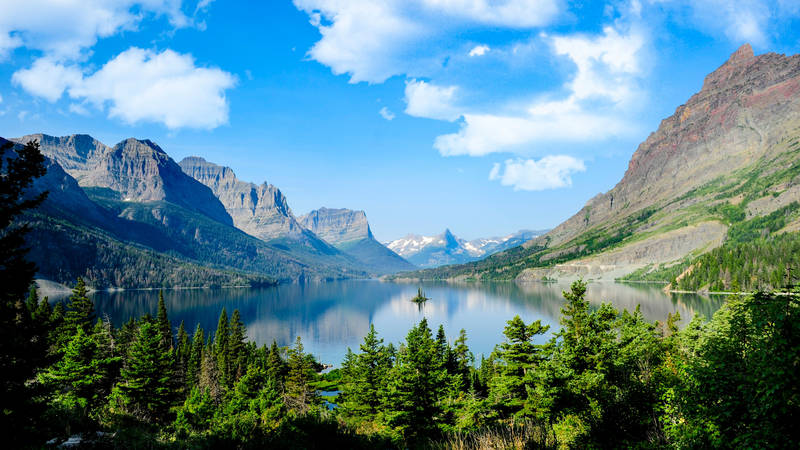Recent changes to a foundational environmental law governing federal development projects will have far-reaching consequences for people and parks.
Last month, the Trump administration weakened the National Environmental Policy Act (NEPA) to allow faster approval of development projects such as highways, oil and gas drilling rigs, chemical plants, and other types of infrastructure on federal lands. This bedrock conservation law lays the foundation for responsible federal project management, and this attack on its effectiveness is a devastating blow that sets our nation’s environmental progress back decades and puts communities in jeopardy.
Signed into law by President Richard Nixon in 1970, NEPA requires the federal government to review and disclose how its actions and projects affect the environment and to take public feedback into account. The law was not specifically designed to address environmental justice issues, but people of color and lower-income people are far more likely than white and higher-income Americans to live near sources of pollution. NEPA is sometimes the only federal law that gives people any way to voice their concerns during the planning phases of projects that could directly affect their health and well-being.
The law has worked for decades by requiring that the government carefully consider public health and the environment before taking any “major federal action” that may “significantly affect” the quality of the human environment. This consideration allows the government to make a better-informed decision on whether to move forward with a given development project and has led to many projects being halted or improved.
In a recent high-profile example, the Supreme Court upheld the need for a thorough NEPA review when it ruled on the proposed Keystone XL Pipeline last month, forbidding the project from moving forward without it. By acknowledging objections of the Confederated Salish and Kootenai tribal government, NEPA also helped stop a major highway expansion near Glacier National Park that would have endangered natural and cultural resources, including wildlife. NEPA reviews and consideration of public input have also helped prevent oil and gas drilling in environmentally sensitive areas, such as lands near Chaco Culture National Historical Park in New Mexico and Dinosaur National Monument in Colorado and Utah.
This legacy of protection changed dramatically on July 15, when the new rule took effect. Here are eight ways President Trump’s attack on NEPA will cause real harm to people and parks.
1. Federal agencies will be able to ignore climate change when approving projects. NEPA previously required agencies to consider a project’s cumulative and indirect effects. By eliminating these requirements, the revised regulations relieve agencies of the duty to consider climate change related impacts in their NEPA analyses. This is likely the most significant and far-reaching environmental consequence of the rule.
2. The voice of the public will be stifled. Public comment periods will be limited, and members of the public who do comment will be expected to have expertise on any subject their comments address, regardless of their stake in the outcome of the project or how it might impact them.
3. The ability to challenge harmful NEPA rulings will be limited. People will be unable to take legal action on any subject not covered during the public comment period, which will restrict individuals in affected communities from being able to adequately defend themselves against pollution and other dangers.
4. Conflicts of interest will increase the chances of abuse. Under the new rule, some contractors and applicants will be able to prepare their own environmental reviews under NEPA, regardless of whether they will benefit from the outcomes, and their reviews will take place without direct federal oversight. This gives the proverbial fox the keys to the henhouse and greatly raises the threat of unethical behavior and biased environmental reviews.
5. Responsible alternatives will be limited. NEPA reviews have typically included a range of options outlining how a project could be completed, including alternatives that might raise overall costs but present healthier outcomes for communities and ecosystems. The new rule requires that alternatives must be economically viable and limited in number, raising the odds that projects will cause harm in order to lower costs.
6. Reviews will be rushed. The new rule stipulates that environmental assessments must be completed within one year and environmental impact statements, a more thorough type of review, must be completed within two years, unless an extension is granted. These impact statements are crucial to ensuring that all parties are able to participate in the process, including local, tribal and state-level stakeholders, and agencies need adequate time to address their concerns. Arbitrary time restrictions benefit developers at the expense of the community members who would be most affected.
7. Reviews will be oversimplified. The final rule implements arbitrary page limits on certain environmental review documents. This change fundamentally narrows the scope and complexity that these documents can provide.
8. Agencies will conduct fewer reviews overall. Some projects that previously required NEPA reviews will no longer be subject to federal analysis under the new rule, disregarding public participation and environmental health entirely.

NPCA Joins Nationwide Coalition Lawsuit to Defend the People’s Environmental Law
Represented by Earthjustice and the Western Environmental Law Center, 20 organizations challenge the Trump administration’s assault on the National Environmental Policy Act.
See more ›It cannot be overstated how dramatically this rule could harm land management for decades to come, causing irreparable harm to people who are already disproportionately affected by environmental injustice. The long-term health consequences for people who are habitually exposed to contaminated water and air — disproportionately low-income people and people of color — are significantly worse than for people in communities with less pollution. These changes come at a time when America’s most vulnerable communities are already struggling with health disparities caused by the COVID-19 pandemic, disparities that are exacerbated by exposure to pollutants.
“It is the single worst environmental rollback of this administration,” said NPCA Deputy Vice President of Government Affairs Ani Kame’enui of the changes. “NEPA is the law that underpins everything else and makes environmental protection possible. This is not just some Lorax thing. Of course we care about the trees. It’s my kids’ favorite book! But there are also real people whose lives will be harmed by this.”
Stay On Top of News
Our email newsletter shares the latest on parks.
NPCA staff, volunteers, advocates and allies have repeatedly spoken out in defense of NEPA since the president proposed these changes, and we will continue to fight to restore these protections, pursuing all legal and legislative options. On July 29, 2020, NPCA and a nationwide coalition of organizations from the environmental justice, outdoor recreation and conservation communities filed a lawsuit challenging the administration’s attack on NEPA.
It should not be considered a luxury to take the time necessary to listen to public opinion, consider how alternatives to a project may lessen the impact of climate change or pollution, and plan infrastructure projects in a responsible manner. These are the lands where we live, the water we drink and the air we breathe. To risk them unnecessarily to rush through more highways and pipelines is simply unconscionable and unlawful.
About the author
-
 Tucker Johnson Legislative Program Manager
Tucker Johnson Legislative Program ManagerTucker Johnson is legislative analyst for natural resources in NPCA's Government Affairs department.